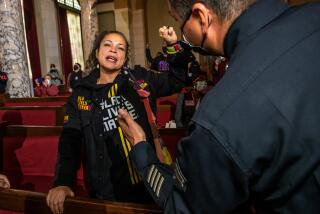Yemeni Admits Lying to a U.S. Immigration Officer
- Share via
SAN DIEGO — A Yemeni man who authorities say may have helped some of the Sept. 11 hijackers pleaded guilty Friday to lying to a federal immigration officer.
Mohdar Abdullah, a former student at San Diego State, has been in federal custody since shortly after the attacks. He will be given credit for time served at sentencing Oct. 8, and will probably be deported to Yemen, said his lawyer, Kerry Steigerwalt.
Abdullah, 24, was charged with filing an asylum application in May 2000 in which he allegedly made the false claim that he was from Somalia and was a member of a minority group facing persecution there.
On Friday, he acknowledged that he had lied to an immigration officer. Abdullah, whose given name is Al-Mohdar Mohamed Al-Mohdar Zeid, told the officer he had entered the United States on Dec. 7, 1998, in New York on an Italian passport.
In truth, he entered three days later from Canada on a Yemeni passport.
The plea did not address allegations that have been made in court documents. Investigators said they suspected that Abdullah knowingly helped three Sept. 11 hijackers who lived in San Diego in 2000.
Abdullah allegedly told the hijackers how to get Social Security cards and California driver’s licenses. He also telephoned a flight school in Florida to arrange for flight lessons and “regularly dined, worked and prayed with the hijackers,” prosecutors asserted.
Abdullah remained illegally in the United States “in order to help the ... hijackers and/or any future hijackers in the furtherance of terrorist activities against people in the United States,” FBI Agent Daniel Gonzalez said in a seven-page statement filed in May.
Steigerwalt, however, said the allegations against his client were never substantiated. “I guess I can just say that if it were true, I would have seen some criminal charges along those lines,” he said.
More to Read
Sign up for Essential California
The most important California stories and recommendations in your inbox every morning.
You may occasionally receive promotional content from the Los Angeles Times.










